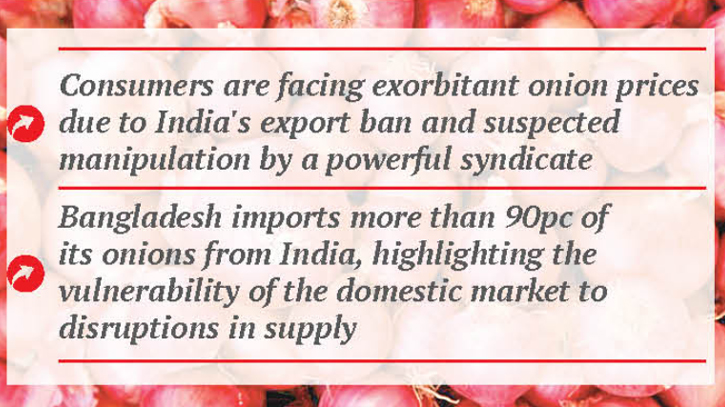
Photo : Messenger
The stability of onion prices in the country has been severely disrupted following India's announcement of an export ban, triggering an exponential surge in its market rates. Within a day of the export ban news, the price of onions soared by Tk 100 to Tk 120 per kilogramme.
Consumers and concerned individuals have expressed disbelief over such a steep rise in onion prices, arguing that a price hike of over Tk 100 per kg in a single day cannot be justified.
They suspect the orchestration of a syndicate by traders, claiming that this powerful entity not only impacts consumers but has also taken the government hostage.
Reports indicate that following the media announcement of India's export ban on onions, retail prices in Bangladesh, including the capital Dhaka, escalated sharply. Consequently, local onions were priced between Tk 220 and Tk 240 per kg in the retail market by Sunday, whereas Indian onions were sold at Tk 200 to Tk 220 per kg.
Mokammel Hossain, a wholesaler in Karwan Bazar, highlighted the dramatic increase, stating that local onions were priced at Tk 130 per kg and Indian onions at Tk 110 per kg just a day before the surge.
Subsequently, local onions surged to Tk 220-240 and Indian onions to Tk 200-220, resulting in decreased interest among buyers who now opt for smaller quantities due to exorbitant prices.
Consumer rights advocates have emphasised that despite the sudden export ban from India, there hasn't been an actual shortage of onions in the market. They assert that adequate supplies exist in storage facilities, attributing the abnormal surge in onion prices to manipulation by syndicates operating within a brief timeframe.
SM Najer Hossain, Vice President of the Consumers Association of Bangladesh (CAB), spoke to The Daily Messenger and strongly criticised the abrupt escalation in market rates, emphasising that prices doubled immediately following India's announcement. He condemned traders for exploiting the situation and causing significant distress among consumers.
Hossain highlighted the lack of government oversight in the market, suggesting that better regulation and exploration of alternative onion import sources could have averted the crisis.
The situation underscores the vulnerability of the onion market to manipulation by syndicates, underscoring the urgent need for stronger government intervention to stabilise prices and alleviate consumer hardships.
Meanwhile, on Sunday at a VAT Day event in Agargaon, Tapan Kanti Ghosh, Senior Secretary of the Ministry of Commerce, criticised the irresponsible behaviour of businessmen in response to the Indian government's sudden export halt of onions. Ghosh raised questions regarding the drastic price surge of Tk 80 in just one day, highlighting the lack of ethical practices among traders aiming for additional profit.
Statistics indicate that Bangladesh's annual demand for onions exceeds 25 lakh tonnes, while production in the last fiscal year was approximately 36 lakh ns. However, around 40 percent of harvested onions are lost between fields and storage. Consequently, the country is compelled to import 10 to 12 lakh metric tonnes annually, with more than 90 percent originating from India.
Earlier, on December 7, India's Director General of Foreign Trade (DGFT) announced a ban on onion exports until March 31 to stabilise domestic market prices. Prior to that, on October 29, India had set the export price of onions at $800 per tonne, effective until December 31, followed by a complete halt in onion exports.
The situation has prompted discussions about the need for ethical business practices, effective market regulation, and diversification of onion import sources to prevent future crises and ensure stability in onion prices for consumers.
Messenger/Disha








